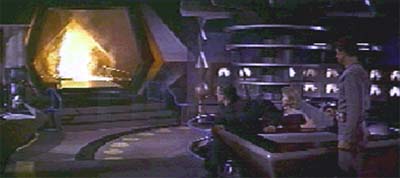
Me and my supercomputer.
Ever since I learned about them, I have wanted a super computer. A SUPER computer was something only the ultra nerds in national laboratories and giant Hollywood studios got to play with. Over the years I helped develop super computers and heaven knows I’ve written about them. A super computer was one that had lots of processors -- a tiny super computer had 64 processors and real super computers had 1024, and a super-duper computer had >10k.

Today I have a super computer, and most of you reading this do too.
Here’s a tally:
Two cores with multiple floating point processors for my main central processing unit from AMD, 96 processors in my two graphics AIBs from ATI, six processors in my physics engine from Ageia, and some unspecified, as of this time, number of processors in my forthcoming Gaming Network Processor (GNP) from Bigfoot. That gets me to over 105 processors in my supercomputer, and it’s sitting under my desk. And those are just the serious processors, I’m not even counting all the little processors, micros-controllers, and state machines in my system that do codecs, audio, background work, and peripheral control.
My super computer, unlike the ones the government and large corporations pay millions of dollars for, is a highly distributed, heterogeneous architectural network. I’m not stuck with a fixed hyper-cube, mesh, or SIMD or MIMD bucket of bolts, no siree bob, my super computer is what super computer designers, architects, and visionaries dream of. And to a certain degree my super computer is another dream of the architects, it is virtual and self modifying, as the processors adapt to the work load and reconfigure themselves in a data-driven fashion.
TerraFLOPS, I got em.
One of the uses for a supercomputer is to run humongous simulations for things like subterranean geophysical analysis, nuclear explosions, weather models, or attack-counter-attack scenarios. Simulations include simulators. My super computer runs lots of simulations. Sometimes I simulate the future with spreadsheets that stretch over 4200 pixels and three screens, other times my super computer is simulating historical probabilities of combat in Europe during the middle of the last century, or starship battles two centuries from now. It also simulates driving conditions in Tokyo at 140 MPH, and monster elimination in various worlds. My super computer rocks.

I think I developed my love of super computers not from watching the rows of Nixie tubes in a Univac, but more so from the concepts of super computers depicted in the movies; movies like Colossus in The Forbin Project, Skynet in Terminator3, HAL in 2001, and the Krell’s computer in Forbidden Planet; those were super computers that filled caverns deep into the planet or an entire, and very large spaceship.

These machines did amazing, powerful, and scary things, and as a kid getting scared was what we wanted almost more than anything (we hadn’t quite discovered girls yet.)
Now we scare ourselves in the corridors of the imaginations of game developers who envision and build amazing worlds with powerful enemies that we can interact with much better than the movies because we’re part of it, we’re in the simulation.
I remember the first flight simulator I got to use. I flew an F18, very scary even though I knew it was a simulation. That took about $700,000 worth of computer and another $100,000 of display. Today I can do it on my desktop with a 30-inch display and my super computer, for less than $10,000.
Today we take this for granted. We don’t even think about having what used to be called a super computer. Doesn’t everyone have that I can hear you asking? Almost and soon everyone will have it.
So now go and count the processors in your super computer, how many do you have? Maybe we have a new macho-measure. Dude, it’s not the clock, it’s not the Gigahertz, it’s not the Futuremark score. How many processors do you have?













